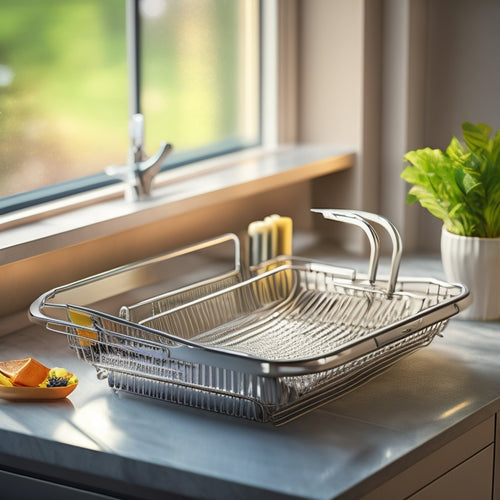
Unlock the Power of Shared Kitchens
Share
In the culinary world, shared kitchens are a game-changer, offering a platform for multiple businesses to coexist and thrive. By splitting costs and sharing resources, entrepreneurs can alleviate the financial strain of going solo. But, let's be honest, it's not all rainbows and unicorns. With multiple businesses comes the risk of conflicts over equipment and scheduling. Clear communication and established protocols are essential in navigating these challenges. And, of course, compliance with regulations is a must. By understanding the intricacies of shared kitchens, you'll be well on your way to accessing their full potential - and that's just the beginning.
Key Takeaways
• Shared kitchens reduce startup costs and provide access to commercial-grade equipment, increasing flexibility in scaling operations.
• Each business in a shared kitchen must obtain its own health permit, highlighting the importance of understanding legal requirements.
• Clear communication and established protocols are crucial in overcoming common challenges, such as equipment usage conflicts and scheduling disputes.
• Finding the right fit involves assessing space needs, evaluating location options, and considering cost and equipment sharing to align with financial goals.
• Shared kitchens foster a sense of community building and collaboration among businesses, leading to increased opportunities and growth.
Understanding Shared Kitchens
A shared kitchen is a commercial food facility that meets stringent requirements. It serves as a hub for multiple businesses to operate under one roof, with each requiring its own health permit to ensure compliance with food safety regulations.
This setup fosters cost sharing and collaboration among entrepreneurs, allowing them to split expenses and share resources. It creates a sense of community building where like-minded individuals can come together, exchange ideas, and drive innovation.
In this environment, creativity thrives, and businesses flourish. By understanding the concept of shared kitchens, entrepreneurs can access new opportunities, reduce startup costs, and focus on what matters most – their culinary creations.
Benefits of Sharing Space
By sharing kitchen space, entrepreneurs can greatly reduce startup costs, as they no longer need to invest in expensive equipment, utilities, and rent, freeing up resources to focus on perfecting their recipes and growing their business.
In a shared kitchen, entrepreneurs can thrive in a collaborative environment, where they can bounce ideas off one another and learn from each other's experiences. Here are just a few benefits of sharing space:
-
Cost-effective solution: Shared kitchens provide access to commercial-grade equipment and facilities at a fraction of the cost of owning or renting a solo kitchen.
-
Increased flexibility: With shared kitchen space, entrepreneurs can easily scale up or down to meet changing demand, without being tied to a long-term lease.
-
Reduced administrative burden: Shared kitchens often handle utilities, maintenance, and other logistical tasks, leaving entrepreneurs to focus on what matters most – their business.
Permitting and Regulations
Finding your way through the intricate web of permits and regulations is a vital step in establishing a shared kitchen. Failure to comply can result in costly penalties and even business closure. To avoid this, it's important to understand the legal requirements and compliance guidelines that govern shared kitchens.
The permit process involves a thorough inspection checklist, ensuring that your facility meets the necessary health and safety standards. In Long Beach, the Bureau of Environmental Health issues permits to shared kitchen facilities, and each business operating within must have its own health permit.
Don't risk your business - navigate the permit process with precision and attention to detail.
Finding the Right Fit
Its operational requirements and business model dictate the type of shared kitchen facility that best suits a catering operation, necessitating a thorough evaluation of available options. When searching for the ideal fit, caterers must consider the following key factors:
-
Space requirements:
Assess the amount of space needed for food preparation, storage, and equipment, ensuring the facility can accommodate your operation's unique needs. -
Location options:
Evaluate the facility's location, considering factors such as proximity to clients, transportation costs, and accessibility for staff and deliveries. -
Cost considerations and equipment sharing:
Weigh the costs of renting or leasing a shared kitchen against the benefits of shared equipment and resources, ensuring that the arrangement aligns with your business's financial goals and operational needs.
Overcoming Common Challenges
Even after identifying the ideal shared kitchen facility, caterers may still encounter a range of obstacles that can hinder their ability to operate efficiently and effectively. One major challenge is navigating the complexities of shared kitchen operations, where multiple businesses must coexist and share resources.
This can lead to conflicts over equipment usage, storage, and scheduling. To overcome these challenges, caterers must focus on collaboration opportunities, such as shared cleaning responsibilities and joint marketing efforts. By doing so, they can increase operational efficiency and reduce costs.
Additionally, clear communication and established protocols are essential in resolving disputes and ensuring a harmonious kitchen environment. By addressing these common challenges, caterers can access the full potential of shared kitchens and achieve long-term success.
Frequently Asked Questions
Can I Use a Private Home as a Commercial Kitchen for Catering?
"Sorry to crush your culinary dreams, but the answer is a resounding no - private homes are not legally permitted for commercial kitchen use, citing health and safety concerns, and catering operations require licensed facilities to operate."
Do Host Facilities Need a Separate Health Permit for Catering Operations?
"No, host facilities do not require a separate health permit for catering operations, as the catering company's valid health permit suffices, ensuring compliance with catering regulations and health permit requirements."
What Are the Office Hours for the Health & Human Services Office?
The Health & Human Services Office, a hub for health services accessibility and community resources, operates Monday to Friday from 8:00 am to 4:30 pm, providing convenient access to essential permits and services.
Can Multiple Businesses Share a Single Health Permit in a Shared Kitchen?
In a shared kitchen, each business must obtain its own health permit, as regulations explicitly state that a single permit cannot be shared among multiple businesses, ensuring accountability and adherence to stringent health and safety standards.
Where Can I Find Information on Reducing, Reusing, and Recycling in Long Beach?
"Did you know that the average American generates 4.4 pounds of trash per day? In Long Beach, you can find information on waste reduction strategies and community recycling programs through the General Services department, promoting a sustainable future."
Related Posts
-

Rustic Hanging Racks for Country-Style Kitchens
Rustic hanging racks are a game changer for your country-style kitchen, blending functionality with charm. They maxim...
-

Rust-Resistant Dish Drainers for Long-Lasting Use
If you're looking for rust-resistant dish drainers, focus on materials like high-grade stainless steel for superior c...
-

Creative Organization Ideas for Tight Kitchen Spaces
To create an organized kitchen in tight spaces, think upwards. Install shelves that reach the ceiling and use wall-mo...


